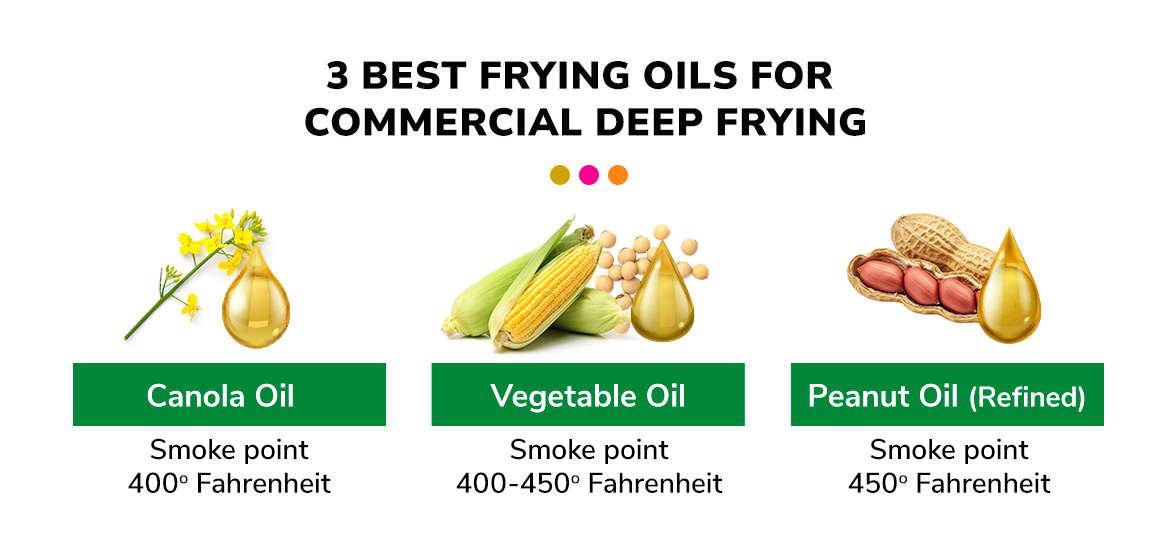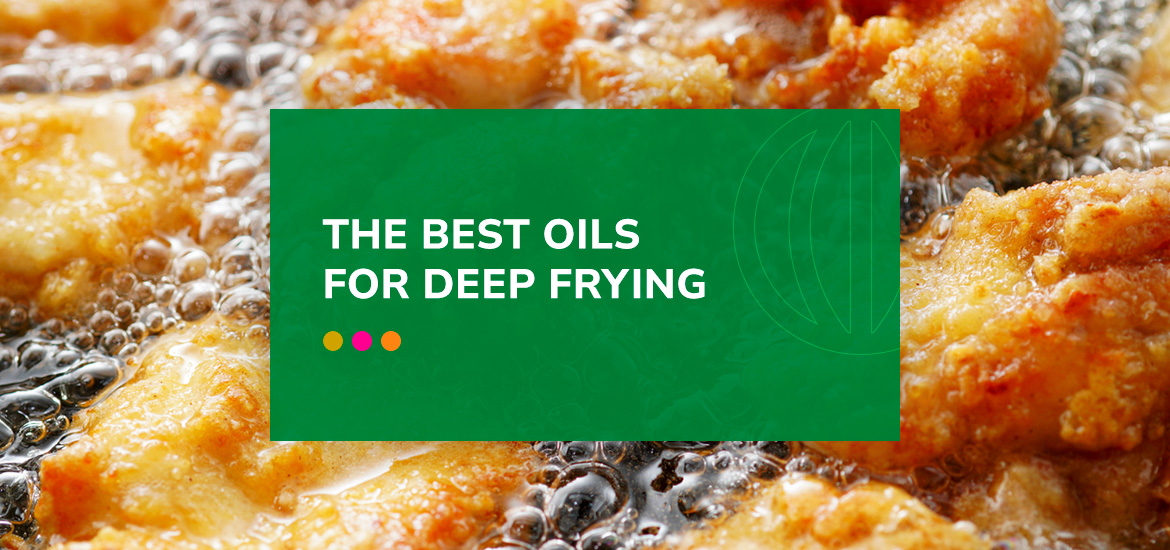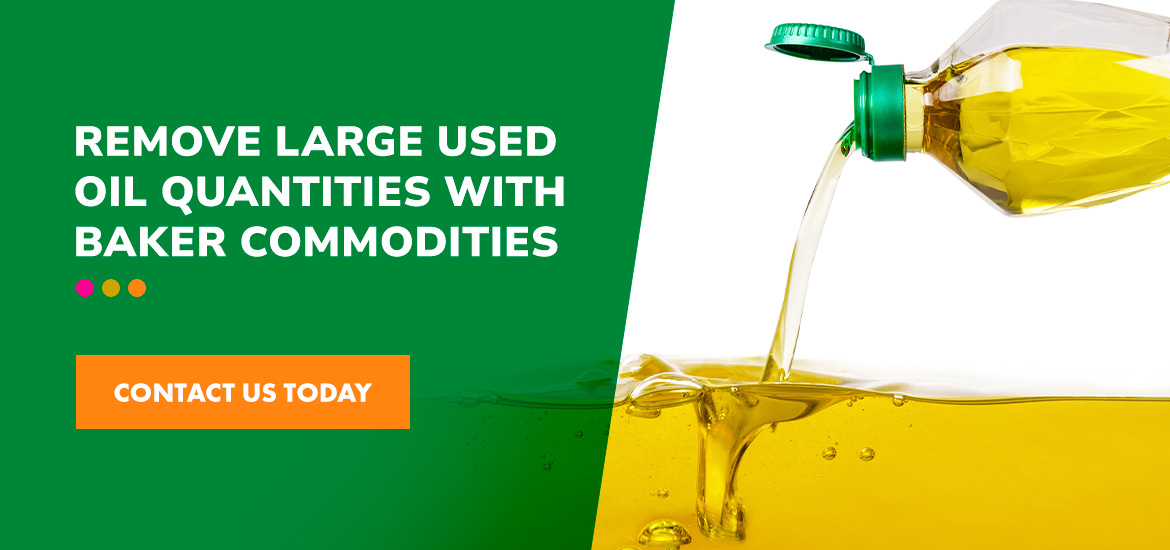The Best Oils for Deep Frying
Table of Contents:
- How to Choose the Right Cooking Oil for Your Application
- 3 Best Frying Oils for Commercial Deep Frying
- Frying Oils to Consider Avoiding in Your Kitchen
- How Often Should You Change Your Fryer Oil?
- How to Dispose of Used Cooking Oil
Creating mouthwatering dishes for others to savor is one of the most satisfying parts of being a cook. When creating fried dishes, you want to make sure you’re using the right kinds of oils. What type of oil do restaurants use for deep frying?
The best oil for deep frying depends on your recipes, preferred flavors and many other factors influencing your cooking techniques. Take a look at the top commercial deep fryer oil options to use in your kitchen, deli or cafeteria.
How to Choose the Right Cooking Oil for Your Application
Commercial deep fryer oil varies by several factors, including cost, taste and overall quality. Depending on your cooking preferences and customers, you’ll likely prioritize one variable over the other. Luckily, several cooking oils offer numerous beneficial factors.
Here are some variables to consider as you browse cooking oils for restaurants:
- Price: If you serve food to hundreds of people daily, affordable cooking oil prices are likely one of your top priorities. Buying oil in bulk allows you to stock up on this essential ingredient in large quantities and keeps you ready to serve a crowd.
- Quality and fat content: Cooking oils contain various levels of saturated and monounsaturated fats. Saturated fats are less healthy, so you’ll likely want to avoid using oils with high contents of these fats. Instead, choose high-quality oils with more monounsaturated fats, which are healthier in small quantities.
- Smoke point: Each cooking oil has a smoke point, which is the temperature at which it starts to smoke and burn. When oil surpasses its smoke point, it starts to emit odors and create unsavory flavors that impact the taste of the food cooking in it. Each oil has a unique smoke point range, and you’ll typically want to choose a cooking oil with a higher smoke point so you can cook with it at various temperatures.
- Heat stability: Cooking oils break down when heated at high temperatures, so you’ll want to choose one that can hold up when exposed to significant heat. The best oils for frying food are those with greater levels of monounsaturated fats, which withstand high temperatures better.
- Flavor and texture: Some oils are rich in flavor, and others have a flat taste. Consider what kinds of foods you plan to fry and choose your cooking oil accordingly to create the best flavor and texture possible. Although saturated fats are unhealthier, they can create more flavorful, crispy foods.
- Allergen potential: Some oils, particularly peanut oil, can cause allergic reactions when consumed. When selecting a frying oil, be mindful of potential allergens and how your choice might impact your customers. While some oils can be refined, deodorized and bleached to remove reaction-causing proteins, they could still be harmful for some patrons.
3 Best Frying Oils for Commercial Deep Frying
So, what kinds of oils are best for commercial deep frying applications? While you can find numerous oils for different kinds of frying, only a few have the necessary elements to create deliciously deep-fried foods. Take a look at three of the best oils for deep frying:

1. Canola Oil
The most common type of oil that restaurants use for deep frying is canola oil. Many chefs favor using canola oil due to its low prices in bulk, high monounsaturated fat content and high smoke point of about 400 degrees Fahrenheit.
With a higher smoke point range, chefs can cook their ingredients more thoroughly without odors and unsavory flavors impacting the food’s quality. Of all your options, canola is one of the best oils for commercial deep frying and cooking oils for restaurants.
2. Vegetable Oil
Vegetable oil is a great go-to for your deep-frying needs. Thanks to its wide availability and low price point, it’s an effective option for high-volume commercial kitchens. While some vegetable oil is actually 100% soybean oil, you can also find blended vegetable oil made from different oils, such as soybean, corn or canola. If you’re in the market for soybean oil, consider using high oleic soybean oil, which is more oxidation-resistant and lasts longer.
Vegetable oil has a high smoke point of about 400-450 degrees Fahrenheit to cook your food thoroughly and leave a crunchy texture. It also contains some levels of monounsaturated fat, which is the healthier type of fat that may reduce heart disease risk and high cholesterol levels in the body when eaten in moderation. For even better frying stability, look for high oleic vegetable oil.
Whether you’re cooking french fries or fried chicken, vegetable oil offers a mild taste that won’t mask your food’s natural flavors. This way, you don’t have to worry about the oil altering the way your dishes are supposed to taste.
3. Peanut Oil
Another effective deep-frying oil to use in your kitchen is peanut oil. This option offers a subtle nutty flavor perfect for deep-frying desserts, vegetables and meats. There are two kinds of peanut oil — refined and unrefined — and refined is the better oil for deep frying. Unrefined peanut oil has a lower smoke point at 350 degrees Fahrenheit.
If rich flavors and crispy textures in your food are your top priority, refined peanut oil is your go-to option. With an impressive smoke point of 450 degrees Fahrenheit, you can add a delicious taste to your deep-fried dishes when using peanut oil. Its high percentage of monounsaturated fat makes it more stable at high temperatures.
This frying oil option can be helpful to keep on hand as an alternative to use when you run out of your main oil choice.
Frying Oils to Consider Avoiding in Your Kitchen
Canola oil, vegetable oil and peanut oil are considered some of the best oils for frying, but they’re not the only oils on the market. If you already have oils such as corn oil or olive oil on hand, you may be curious about whether you can use them for deep frying.
While corn oil can be used for deep frying to some extent, its polyunsaturated fats eventually break down, making it more difficult to cook with and making foods more oily. In comparison, olive oil’s smoke point of 350 degrees Fahrenheit is too low for deep frying. It’s also more expensive than other oils.
Another popular oil for frying is sunflower oil. It has a high smoke point and a mild flavor that results in crispy, tasty treats. However, like corn oil, it has similar issues with polyunsaturated fats. You’ll likely have to replace it more frequently than other oils.
Although you could use these oils for deep frying, they won’t be as effective or affordable as other options. No matter what you’re frying, a neutral, long-lasting oil with a high smoke point is your best bet for creating delicious meals.
How Often Should You Change Your Fryer Oil?
If you cook a lot of fried dishes, you’ll want to change your fryer oil at least every couple of days — daily if possible to maintain peak flavor and food quality. If you fry less frequently and mainly fry foods without coatings, your oil will last longer, but you should prioritize changing it regularly. Signs of dirty fryer oil are a darker color and a different fried food flavor.
How to Dispose of Used Cooking Oil
Whether you’re an experienced chef or starting as a cook in training, you likely know the golden rule of disposing of cooking oil — you should never pour used oil down the sink drain. Even in professional settings, oil has set guidelines for safe disposal. In restaurants where large oil disposal is common, you should avoid storing and throwing away used oil in the trash. Some states even restrict this action altogether due to the harm that used oil can cause to the environment. Incorrectly disposing of oil can result in fines, penalties and clogged drains.
For larger used oil removal, such as in restaurants that fry many dishes daily, you can trust Baker Commodities to help you responsibly dispose of your oil. With the help of safe bulk oil disposal to clear your restaurant kitchen of leftover deep frying messes, you can get back to creating delicious meals in no time. This method is the best course of action to save your drains and plumbing from becoming backed up or violating state oil disposal laws.
Remove Large Used Oil Quantities With Baker Commodities
If you work with cooking oil often, Baker Commodities can make your oil disposal easier. Without proper grease and oil removal, you may face fines and penalties on top of a clogged drainage system. We prioritize collecting used grease and oil you no longer need, so you can get rid of your kitchen’s used oil in an eco-friendly and ethical manner. Our team uses carbon-negative processes to lower greenhouse gas emissions and contribute to a more sustainable planet.
Whether you work in hospitality, education or another industry where you cook with oil frequently, Baker Commodities can work with you to create a grease collection pickup schedule that works for your needs. Contact us today with any questions about our services.




